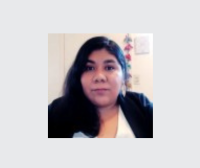HWW Alumni Board Spotlight: Blanca Garcia-Barron
Meet Blanca Garcia-Barron, Library Technician at Mt. San Jacinto Community College in Riverside County, California and a graduate student in the MLIS program at San José State University.
As a current member of HWW's alumni board, Blanca consults with the HWW PI and staff on future workshop designs and other programming. She earned her M.A. in borderlands history at The University of Texas, El Paso and holds a B.A. in public and oral history from the California State University, San Bernardino. Blanca was a Career Diversity Fellow with the American Historical Society from 2018 to 2020 and a Humanities Without Walls Fellow in 2019.
She is also a Kaleidoscope Program Scholar (2022-2024) with the Association of Research Libraries. Her current studies focus on archival practices and theory, digital preservation, and critical librarianship. Pivoting from the history field to academic librarianship, Blanca found a renewed sense of self and a place where her advocacy of BIPOC students is central to her practice.
Describe Humanities Without Walls in 1-2 sentences.

HWW was a great space to express any desire or willingness to pursue careers adjacent or outside of the tenure-track.
What is one thing you learned at the HWW workshop that impacted your life?
One of the most important things I learned or gained from the HWW workshop was recovering the idea of choice. Having anxiety about the job market and the tendency of our programs and fields privileging the academic tenure-track as the only valid choice for the PhD created cycles of stress. I felt demoralized by my limited choices, but attending the workshop made me realize my value beyond the PhD. Ultimately, I decided to leave the PhD, and despite struggling with that decision afterward, career diversity efforts like HWW instilled confidence in my skills, experience, and worth.
What advice do you have for workshop participants?
Some advice that I have for workshop participants is to think about alternative mentorship models. I know it can be difficult to establish professional relationships outside of the PhD, but if there are professional associations in a potential field/career you are interested in, it might be useful to find out the kinds of resources they offer. For example, as I pivoted to the Library Information Science and Archives field, some of their professional associations have established mentorship programs that are useful in navigating issues and trends.
What was the most memorable part of the HWW workshop?
The most memorable part for me was creating community with other fellows, especially with those I shared philosophies, values, and backgrounds with.